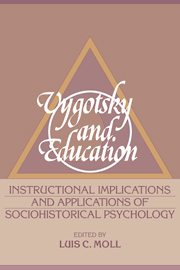Book contents
- Frontmatter
- Contents
- List of contributors
- Preface
- Acknowledgments
- Introduction
- Part I Historical and theoretical issues
- 1 Vygotsky: The man and his cause
- 2 The historical context of Vygotsky's work: A sociohistorical approach
- 3 Cognitive development and formal schooling: The evidence from cross-cultural research
- 4 The voice of rationality in a sociocultural approach to mind
- 5 The social origins of self-regulation
- 6 Vygotsky, the zone of proximal development, and peer collaboration: Implications for classroom practice
- Part II Educational implications
- Part III Instructional applications
- Name index
- Subject index
2 - The historical context of Vygotsky's work: A sociohistorical approach
Published online by Cambridge University Press: 05 June 2012
- Frontmatter
- Contents
- List of contributors
- Preface
- Acknowledgments
- Introduction
- Part I Historical and theoretical issues
- 1 Vygotsky: The man and his cause
- 2 The historical context of Vygotsky's work: A sociohistorical approach
- 3 Cognitive development and formal schooling: The evidence from cross-cultural research
- 4 The voice of rationality in a sociocultural approach to mind
- 5 The social origins of self-regulation
- 6 Vygotsky, the zone of proximal development, and peer collaboration: Implications for classroom practice
- Part II Educational implications
- Part III Instructional applications
- Name index
- Subject index
Summary
In recent years the Western world has witnessed an increasing interest in Vygotsky's contribution to psychology and education. It might even be said that Vygotsky is “in.” What has happened to make the work of a psychologist who has been dead for over 50 years so relevant now? What is it in Vygotsky's works that invites psychologists and educators to scrutinize his writings when in the normal course of events they would be subject matter mainly for historians of science? It may be that the recent translations of some of his writing and the work of researchers inspired by the sociohistorical approach have a lot to do with it, but these causes alone cannot fully explain why so much attention is given to an approach to psychology that had been forgotten for so long.
It would be prolix, even pretentious, to try to answer these questions adequately. The goal of this chapter is more modest. It will try to outline a sociohistorical approach to Vygotsky's contribution to psychology and education.
Vygotsky's conception of history and the use he makes of it in relation to science, to psychology, and to the history of psychology are something we think worth taking seriously. As Scribner (1985) points out, Vygotsky's uses of history are not exhausted by the phylogenetic history of the species, the history of the development of cultures, or the history of the ontogenetic individualization of each person.
- Type
- Chapter
- Information
- Vygotsky and EducationInstructional Implications and Applications of Sociohistorical Psychology, pp. 59 - 88Publisher: Cambridge University PressPrint publication year: 1990
- 8
- Cited by



